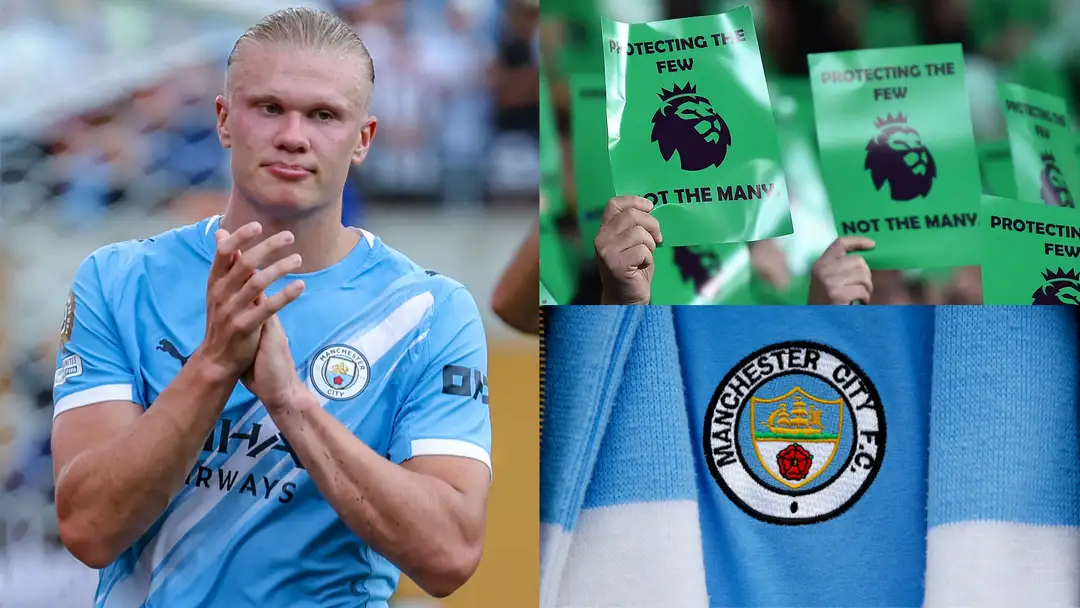Blog
A one-billion-dollar fine for Man City?! Ex-player makes brilliant lower-league money plan – if Pep Guardiola’s team receives massive punishment in 115 charges FFP dispute
Terry Phelan, a former Manchester City player, has devised an amazing strategy for the Premier League giants to pay a £1 billion FFP fine.
The verdict in the FFP case has yet to be delivered. Punishments have been speculated about, although the City continues to assert innocence.
What happened?
The Etihad Stadium team denies any wrongdoing in the Financial Fair Play issue, despite facing at least 115 charges. A final decision is pending after an impartial hearing.

THE BIGGER PICTURE
The verdict will be rendered at some point, with potential consequences being discussed. City might face points deductions, transfer embargoes, even ejection from English football’s top league.
THE BIGGER PICTURE
The verdict will be rendered at some point, with potential consequences being discussed. City might face points deductions, transfer embargoes, even ejection from English football’s top league.
Did you know?
Despite arguments against the majority of sanctions, a significant fine may still be imposed. Sheikh Mansour, the billionaire owner, will not have any problems paying, and he may be granted the opportunity to benefit people farther down the EFL pyramid.

What Phelan Said
Phelan, speaking in collaboration with William Hill, informed GOAL about City’s next steps and chances of avoiding punishment. “How long will it take – ten or fifteen years? Let us appreciate them while we can. Let us appreciate football.
“I understand what supporters are like; it happened to Everton and this club; why isn’t it happening to Manchester City? It is not happening for a reason. What’s the reason? I don’t know; only the top men know why this isn’t happening.
“Maybe they will be fined £100 million, 300 million, or 400 million. I’d be glad if they were fined a billion pounds and then distributed it to all of the other clubs in the lesser levels.”
£1 Billion Fine for Man City? Former Player Proposes Clever Lower-League Plan Amid Potential FFP Punishment
The football world is buzzing with speculation as Manchester City await the outcome of their ongoing legal battle over alleged breaches of Financial Fair Play regulations. With over a hundred charges hanging over the club, one former Premier League player has made headlines by suggesting a bold—and surprisingly clever—idea: if City are hit with a mammoth fine, the money should be distributed directly to support clubs in the lower leagues.
The proposal, while hypothetical at this stage, has stirred a powerful conversation around football finance and fairness. With reports swirling that a potential fine could stretch up to a staggering £1 billion, the ex-player’s plan suggests that such funds be repurposed not to strengthen elite systems further but to rescue and uplift the struggling tiers of English football that serve as the sport’s foundation.
While Manchester City continue to deny any wrongdoing and are fighting the allegations with top-tier legal support, the suggestion offers a thought-provoking glimpse into how punishment—if it comes—might be turned into opportunity for the broader football ecosystem.
The former player, whose identity has quickly circulated on social platforms, pointed out that clubs in League One, League Two, and even parts of the National League are regularly fighting for survival. Many operate on razor-thin budgets, face crumbling infrastructure, and struggle to develop young talent due to limited resources.
The argument is simple: if Manchester City, one of the richest football entities in the world, is found guilty of breaking financial rules, then any resulting financial punishment should be used for the betterment of the game’s roots—not absorbed back into elite football’s upper circles.
The reaction from fans has been mixed. Some City supporters have dismissed the proposal as opportunistic and premature, defending the club’s spending as fair and transparent. Others, even from rival camps, see it as an inspired idea—using the fallout of football’s most high-profile FFP case to generate meaningful change where it’s needed most.
Financial Fair Play was introduced to level the playing field, ensuring clubs spend within their means and avoid unsustainable debt. Manchester City, since their rise to global dominance, have been under near-constant scrutiny over the source and structure of their revenue streams. The current case, with its extensive list of charges, is seen as one of the most important legal battles in Premier League history.
If City are eventually found guilty, the league faces a monumental decision. Will the punishment be financial? Will points deductions or even relegation be considered? And most importantly, how will the funds from a fine—if levied—be used?
The ex-player’s idea may not be part of the formal process, but it’s gaining momentum with fans and pundits alike. Several lower league managers have even voiced support for the concept, calling it a “once-in-a-generation chance to fix what’s broken.”
Beyond the footballing consequences, there’s a moral dimension to this story. At a time when grassroots clubs are closing their doors and youth academies are being shut due to lack of funding, the idea of redistributing elite fines feels, to many, like poetic justice.
As the case moves forward, Manchester City remain focused on their on-field dominance under Pep Guardiola. But off the pitch, the possibility of financial repercussions looms large—and with it, the growing call for those funds to be used as a lifeline for the rest of English football.
The Premier League, FA, and financial regulators will ultimately decide what happens next. But regardless of the verdict, this one proposal has already sparked a vital debate: if the biggest clubs break the rules, who really pays the price—and who should benefit from the fallout?
In the weeks ahead, all eyes will remain not just on Manchester City’s legal team, but on how football’s power brokers respond to the question that now refuses to go away: can justice for one become salvation for many?
-

 Blog8 months ago
Blog8 months ago“Courtside to Aisle-Side: Tyrese Haliburton and Jade Jones Set New Wedding Date”
-

 Blog8 months ago
Blog8 months agoPat Kelsey sends a strong three-word fiery message to the Louisville basketball’s team after their Cardinals 14th win…
-

 Blog8 months ago
Blog8 months agoMikaela Shiffrin responds to cross-country skier Jessie Diggins’ letter following her failure to secure a solitary podium finish at the FIS Nordic Worlds
-

 Blog10 months ago
Blog10 months agoNetflix releases “The Underdog,” a much-anticipated documentary about Drew Brees. slated for publication on the 25th
-

 Blog6 months ago
Blog6 months agoBehind the Turns: Netflix’s Upcoming Documentary on Mikaela Shiffrin’s Fights, Fears, and Love
-

 Blog7 months ago
Blog7 months agoLegacy Tour Led Zeppelin has officially confirmed their 2026 reunion tour, which will be their first extensive live performances since 2007. The “Led Zeppelin Legacy Tour 2026” will begin on June 10, 2026, at Los Angeles’ SoFi Stadium.
-

 Blog3 days ago
Blog3 days agoReferee from FIFA weighs in on Rangers’ penalty claim, raising major VAR concerns regarding Chermiti appeal
-

 Blog8 months ago
Blog8 months agoWomen’s Slalom Run 1 at the FIS Alpine Skiing World Cup: Are
